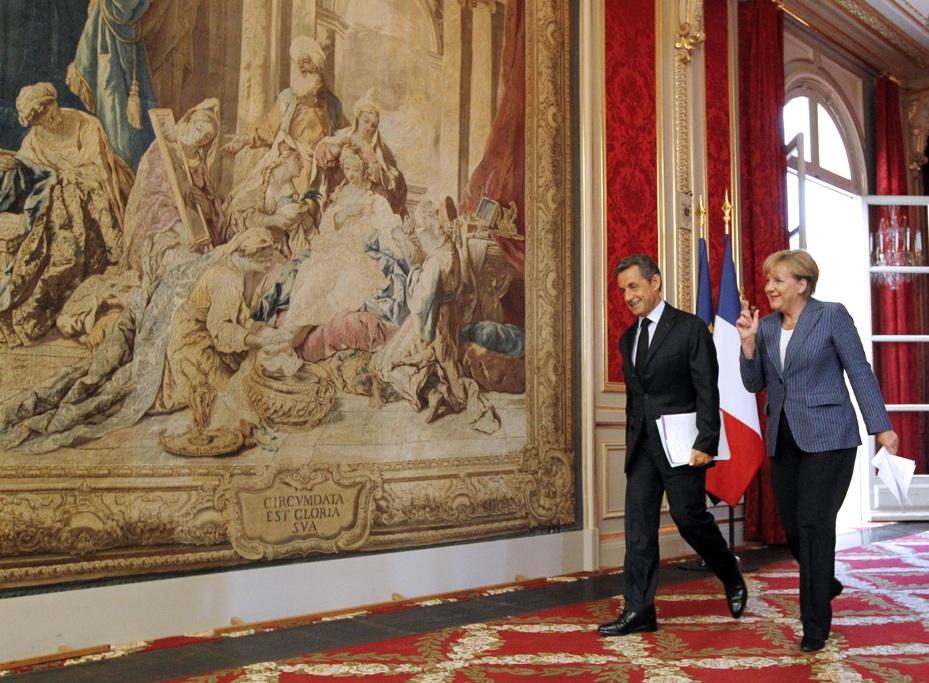Merkel and Sarkozy propose closer regional cooperation
France’s president Nicolas Sarkozy and German Chancellor Angela Merkel arrive for a joint press conference at the Elysee presidential palace in Paris on August 16, 2011 after a meeting between the two leaders on debt crisis.
In a rare moment of high drama involving two familiar leaders, global economy watchers and investors worldwide today had their eyes on the chief stewards of Europe's two biggest economies: German Chancellor Angela Merkel and French President Nicolas Sarkozy.
The big question as the two met in Paris: facing a worsening debt crisis, what would the two most important leaders in Europe do?
Would they expand a European rescue fund? Turn to (still imaginary) euro bonds as a way to spread poisonous debt across the zone? Announce tougher rules for the so-called PIIGs (Portugal, Ireland, Italy, Greece)? Something else?
The meeting took on an added sense of urgency after new figures today revealed that Germany's economy — Europe's largest — has essentially ground to a halt.
More from GlobalPost: Is Europe finished?
With that as the tense backdrop, "Merkozy" emerged from a 2-hour meeting at the Elysee Palace.
Germany and France will work together.
The two countries will press for closer euro-area economic integration with tougher deficit rules and stricter supervision to stamp out the debt crisis, Bloomberg reports.
Merkel and Sarkozy rejected euro bonds and expanding the 440 billion-euro ($633 billion) rescue fund. They proposed debt limits be written into national law and a “euro council” to be headed by European Union President Herman van Rompuy established as part of a planned “economic government” for Europe.
Here are the juiciest bits from the post-meeting presser:
"It’s very obvious that in order for this to work we need a stronger convergence in finance and economic policy within the euro zone and Germany and France are at the vanguard of that effort,” Merkel said.
“People always seem to have the feeling that there is one method that we’ll spring us out of the crisis and in this context there seems to be that the last resource we have is euro bonds,” the German leader said, soundly rejecting the idea of euro bonds. “I don’t think Europe has come to its last resource and I don’t think we can solve the problem with a single big bang," she said. Rather, “we need to work steadily and step by step to win back confidence. I don’t think that euro bonds will help us now with this.”
“Euro bonds — we can imagine having them one day,” Sarkozy added. “But it will be at the end of a process of integration, not the beginning.” Right now, “in their current state, European institutions,” are not ready for this.
"France and Germany must converge, the status quo is impossible," said Sarkozy.
More from GlobalPost: Europe's debt solution?
U.S. markets fell immediately on the news, and the euro slipped from a 3-week high on the dollar.
“It’s hugely disappointing and what they say is not going to work,” Marchel Alexandrovich, an economist at Jefferies International Ltd. in London told Bloomberg. “They think they have all the time in the world and they don’t.”
Malcolm Barr, an economist with JPMorgan Chase & Co. in London, told Bloomberg that Merkel and Sarkozy’s lead “may be helpful in suggesting unity of purpose.”
“But tough questions about sanctions for fiscal misbehavior and the degree of sovereignty nations are prepared to pool remain unanswered,” he said.
Here's how euronews played the story:
Every day, reporters and producers at The World are hard at work bringing you human-centered news from across the globe. But we can’t do it without you. We need your support to ensure we can continue this work for another year.
Make a gift today, and you’ll help us unlock a matching gift of $67,000!
